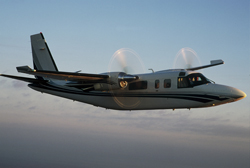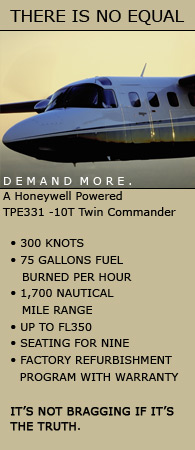States Increasingly Look to
General Aviation to Boost Coffers

Louis M. Meiners, Jr., CPA

As states battle through the economic ravages of these recessionary times, they are increasingly scouring the land for opportunities for new tax assessments. This takes the form of new legislative measures, as well as aggressive interpretations by state revenue departments under increased pressure to enhance revenues.
RECENT LEGISLATIVE CHANGES
California: Like most states, California imposes a use tax that is designed to be complementary to the state�s sales tax. It applies to property acquired outside the state for ultimate use within the state. California statutes previously provided that an aircraft purchased outside the state that did not enter the state for the first 90 days of ownership was not presumed to be purchased for use within the state, and therefore was protected from use tax. Effective September 30, 2008, the three-month period was extended to 12 months, greatly broadening the scope of California�s tax.
Bringing the aircraft into the state within the first 12 months creates a rebuttable presumption that it is subject to use tax if the aircraft was purchased by a California resident, or the aircraft was subject to property tax in California during the first 12 months of ownership. California retained its interstate commerce exemption for business aircraft used primarily in interstate commerce and as well as aircraft use in commercial service.
New York: New York has long had a commercial aircraft exemption for business aircraft. Their state�s exemption applied not only to aircraft used for hire, but also to business aircraft used to transport company employees operating under FAR Part 91. Effective June 1, 2009 New York has narrowed its exemption, removing business aircraft not used in commercial service from the exemption.
Georgia: In an obvious effort to encourage maintenance of out-of-state aircraft in Georgia, the state recently extended a sales tax exemption for aircraft repair parts, provided the aircraft is not registered in Georgia. This provision was scheduled to expire on June 30, 2009 and was extended to June 30, 2011.
Michigan: This state recently expanded its flyaway exemption for sales tax on the sale of an aircraft temporarily in the state for purposes of the sale, pre-purchase evaluation, customization, improvement, maintenance, or repair. For transactions occurring after June 11, 2009 the law requires the aircraft to leave the state within 15 days after the date of the sale and completion of any underlying pre-purchase evaluation or repair. This exemption does not apply to aircraft registered in Michigan either before or after the sale.

Were it not for limitations imposed by the United States Constitution and enforced by the United States Supreme Court, aircraft operators would be continuously bombarded with multiple assessments, potentially in every state in which they land. Taxing visitors is both politically acceptable and a potentially significant source of revenue.
The Supreme Court has long recognized the ability of the state to tax property involved in interstate commerce provided such tax does not violate the dormant Commerce Clause of the United States Constitution. In Complete Auto Transit vs. Brady, 430 U.S. 274 (1977), the Supreme Court determined that a state tax on interstate commercial activity violates the commerce clause unless it (1) is fairly apportioned, (2) is applied to an activity with substantial nexus to the taxing state, (3) does not discriminate against interstate commerce, and (4) is fairly related to the services or benefits provided by the state.
In this very well reasoned, pragmatic interpretation of a state�s right to tax interstate commerce, within limits, the court affirmed the Mississippi State Supreme Court�s decision holding that a pro rata tax could be imposed on an entity with large in-state operations. The company is responsible for its fair share of taxes so long, but only so long, as the tax does not discriminate against interstate commerce, there is no danger of interstate commerce being smothered by cumulative taxes of several states, and there is no possibility of any other state duplicating the tax involved. Although that particular taxpayer was held liable for gross income derived from in-state services, the interstate business community was strengthened by the limitations imposed by the Supreme Court of the United States.
Unfortunately, aircraft taxation is far from uniform throughout the United States. A few states have no sales tax at all, while several states have registration fees or excise taxes in lieu of sales tax. Some states tax the lease stream of rental aircraft, while some tax the original purchase price and exempt the rental; and as you might have guessed, some states tax both. For states that tax the rental stream, some states tax the entire rental stream for any aircraft based in the state, while others tax a proportionate amount based on in-state use.
Although a basic principle of use tax is that it provides a credit for taxes paid to other states, the hodge-podge collection of taxing mechanisms applied to aircraft often eliminates use-tax credits, thereby resulting in potential multiple taxation of the same aircraft by several states. Aircraft operations therefore are often taxed in multiple states for the same aircraft.
Before a state can tax an aircraft operator constitutionally, it must first have sufficient contacts with the person or entity to create a nexus for taxation. Nexus is a continuing battle throughout the country and is the subject of significant litigation, yet with very ill defined parameters. Often, state tax administrators make assessments with little regard to nexus limitations. The states have the ability not only to make assessments, but also to impose liens on aircraft that often makes contesting the tax impractical.
Examples of recent state enforcement actions include the following:
Florida: An aircraft purchased outside the state of Florida but brought in during the first six months of ownership by a non-resident may be subject to Florida use tax just for landing on an interstate trip.
Michigan: A new initiative aimed at flight schools attempts to tax the aircraft as well the lease stream on the same aircraft.
Texas: In a recent about-face by the Comptroller�s office, Texas has decided to challenge a long-standing sale-for-resale exemption for leased aircraft.
Maine: The state has a formal program tracking aircraft presence in the state and making assessments against visitors.
SUGGESTIONS FOR PROPERLY CONTROLLING SALES AND USE TAX
The vast majority of states have some opportunity available to control sales and use tax on the purchase and lease of aircraft based in their jurisdictions. In very limited cases it may be necessary for an aircraft to be taxed in more than one jurisdiction; however, this is the exception rather than the rule.
Most state tax departments recognize that nexus requires more than a mere trip through the state. Many of the states use www.flightaware.com or other tracking services for the purpose of generating notices and ultimately making assessments. A few states use bounty hunters who attempt to collect sales tax from aircraft operators for a percentage fee, and the most likely source of this information would again be flight-tracking software.
To the extent that you owe sales or use tax in one or more jurisdictions where you have nexus, we strongly encourage you to pay it. To the extent that you travel regularly in interstate commerce and generally do not have nexus in most jurisdictions, we encourage you to suppress your N-number and avoid confrontation. You may suppress your N-number by visiting the following website: http://web.nbaa.org/ops/security/barr/.
Lou Meiners is an Aviation Tax Consultant for Advocate Consulting Legal Group, PLLC, a law firm whose practice is limited to serving the needs of aircraft owners and operators relating to issues of income tax, sales tax, federal aviation regulations, and other related organizational and operational issues.
IRS Circular 230 Disclosure: New IRS rules impose requirements concerning any written federal tax advice from attorneys. To ensure compliance with those rules, we inform you that any U.S. federal tax advice contained in this communication is not intended or written to be used, and cannot be used, for the purpose of (i) avoiding penalties under federal tax laws, specifically including the Internal Revenue Code, or (ii) promoting, marketing or recommending to another party any transaction or matter addressed herein.






